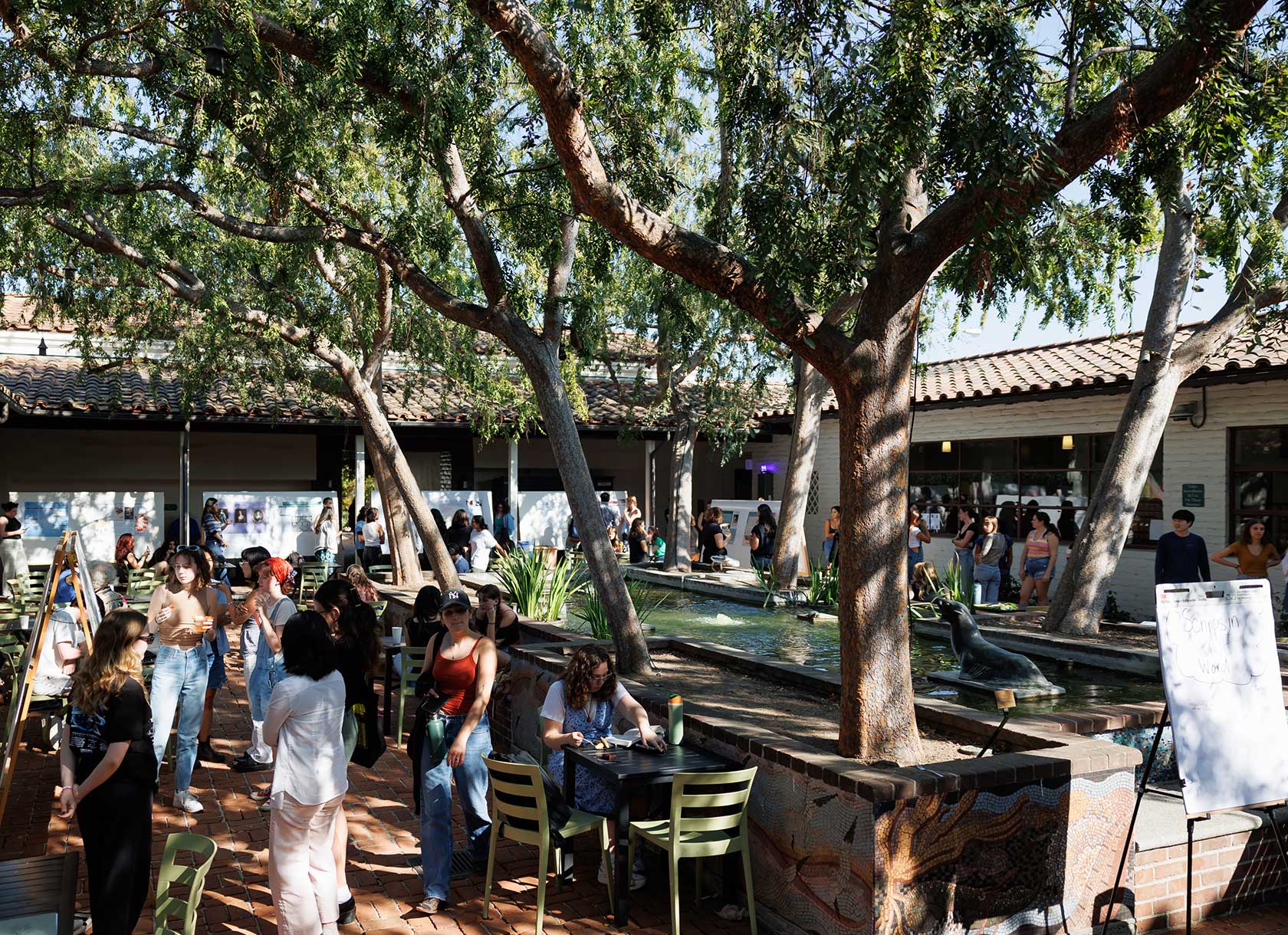
Associate Dean of Faculty and Professor of English Warren Liu speaks with Research Tea presenter Skye Curren ’25.
On a warm afternoon on September 25, Scripps students, faculty, and staff gathered in Seal Court for the annual Scripps Research Tea. This event is held at the beginning each academic year to highlight the research endeavors of Scripps students. No project was alike—from tracking plants’ mating behavior to unearthing archives of married students at Scripps, the great diversity of students’ academic interests was on full display.
Scripps College supports students’ research projects every summer through funding from the Mary W. Johnson and J. Stanley Johnson Research Award, the Scripps Undergraduate Research Fellowship in Environmental Analysis, the Racial Justice and Equity Fellowship, the Virginia J. Esterly Award, the Mellon Interdisciplinary Humanities Initiative, the Arthur Vining Davis Foundations Internship, and the Ellen Browning Scripps Internship. Each year, students craft independent research with faculty mentorship or join existing faculty-led projects.
“The primary purpose of the tea is to celebrate the students and their faculty mentors,” says Associate Dean of Faculty and Professor of English Warren Liu, “but it also provides a terrific opportunity for the entire Scripps community to gather in support of our central academic mission, engage with the students, and learn more about their work.”

Scripps’ annual Research Tea is open to the 7C community to learn about students’ research findings
The Racial Justice and Equity Fellowship allowed Lucy Waggoner-Wu ’25, a dual major in organizational studies and religious studies, to conduct research in oral histories of how spirituality and love appear in the lives of people committed to justice.
“Love and spirituality are fundamental to how a lot of people imagine different kinds of worlds,” says Waggoner-Wu. “I wanted to especially focus on women and queer people of color who are often excluded from academies.”
Waggoner-Wu plans to expand on her summer research in her senior thesis and beyond Scripps. “It’s definitely the kind of work that I would want to keep doing in my life, whether in a formal way or not,” she reflects.
Margaret Mattson ’25, a biology major and double minor in data science and bioethics, shares a similar passion for her research. With support from the Johnson Fellowship, Mattson spent her summer investigating the genome response of plants when they are pollinated with pollen from another species. “This project gave me a lot more independence with computational research,” shares Mattson. “I threw myself in and learned to troubleshoot and learn to use new software by myself.”
Not only did Mattson develop new skills in her summer research, but she also made a significant discovery in her field: a large increase in stress response and immune-related genes in the female plants. The finding indicates one of the first few steps of reproductive isolation — the first time this has been characterized in plants.
“This research is laying the foundation for my year-long thesis,” she shares. “The skills and techniques learned from this will go on to directly inform my doctorate in genetics.”
For Skye Curren ’25, an English major and French minor, her summer research also helped define her post-graduation plans. With the Arthur Vining Davis Foundations Internship at Denison Library, Curren researched two collections of wartime letter collections: the Mary Alice Jaqua Papers and the Suzanne McPherson Collection. Curren found that both collections humanize those living during World War II and illuminate women’s roles at the front. Beyond her findings, Curren’s positive experience working with library archives opened an exciting career path.
“I’m considering pursuing a master’s in library science,” says Curren. “I discovered how much I like looking at physical media like photographs and letters and seeing commonalities between them.”
For Waggoner-Wu, Mattson, and Curren, the Research Tea provided them the opportunity to share their academic passions and transformative experiences with their peers and other faculty.
“For me, I most enjoy seeing students learn from each other,” Liu says. “The summer research grants provide an amazing opportunity for students, and it’s always nice to see our students at the Research Tea serve as an inspiration for their peers, who might also then be motivated to apply for a summer research grant themselves.”

